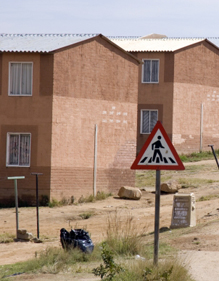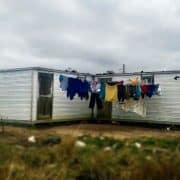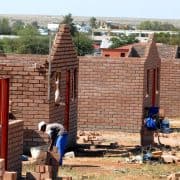|
Getting your Trinity Audio player ready...
|
 By Chantelle Benjamin
By Chantelle Benjamin
22 March 2012 – Gross irregularities in Gauteng’s government housing scheme, particularly the allocation of more than R7-million in subsidies, have prompted calls by the province’s Standing committee on public accounts (Scopa) for a forensic investigation.
A report by Scopa showed that a number of people had benefited from the subsidies, without being registered on the housing subsidy system. The committee has given Local Government and Housing MEC Humphrey Mmemezi three months to complete the investigation.
Glenda Steyn, Democratic Alliance Gauteng caucus chief whip and spokesperson for public accounts, said the housing subsidy system had been “extremely problematic for many years” and its very structure laid the scheme open to corruption and fraud.
She said the entire housing allocation and subsidy system needed to be improved, adding that the present system did not encourage trust and left communities with the impression that officials were corrupt.
“It is difficult for beneficiaries to see where they are on the list, so they do not know when they are likely to be awarded a house, and lack of proper control makes it easy for an official to say: ‘give me R500 and I will add your name to the list’.”
According to unconfirmed reports, the department said the R7.4-million was given to elderly people who were awarded housing subsidies first and later placed on the housing allocation list.
This followed Scopa uncovering the fact that R7.4-million was awarded to people not on the list.
This still points to irregular management of the housing subsidies list, for which there is an accepted process. It raises questions about how other rules are being bent.
Steyn said the situation was unlikely to improve as demand for housing continued to outstrip government delivery, and people became more desperate and suspicious of the process. This also made them more likely to resort to fraud.
Corruption Watch is investigating a detailed complaint which revealed that housing officials are selling RDP houses in Gauteng to people who are not on the allocation list.
Another problem is the awarding of RDP homes to the same people in different provinces, robbing others on the list of a home.
Steyn believes the only solution to the existing housing list problems is to establish a national housing database, similar to the national voters roll.
“It would only allow people to appear on the system once and would limit the duplication we are seeing now, with people successfully applying in Limpopo for an RDP house, and then moving to Gauteng and doing so again.”
She said another weakness of the scheme is that people are not allowed to choose where they would be like to be allocated.
“It would be more helpful if people were notified that they were on the top of the list and were given first right of refusal to areas allocated until they found a place they found suitable to live in.”
The problem is not specific to Gauteng, although the housing budget in this province is a generous one.
The Special Investigating Unit (SIU) told parliament in March 2011 that it was being flooded with claims of corruption in the Department of Human Settlements, particularly regarding subsidies and housing allocation.
Former SIU head Willie Hofmeyr said the longest running project being conducted by the unit was its investigation into the housing subsidy system and contracts.
He said at least half the projects undertaken by the department were “problematic in some way”.
MEC Humphrey Mmemezi’s office did not reply to questions around Scopa's directive or the state of the housing subsidy scheme, despite being given three days to reply.
The Department of Human Settlements is also being asked to explain why it spent R1.74-million on hiring consultants to draw up its last financial statements for the year ended 31 March 2011.
Read the full Scopa report here.







